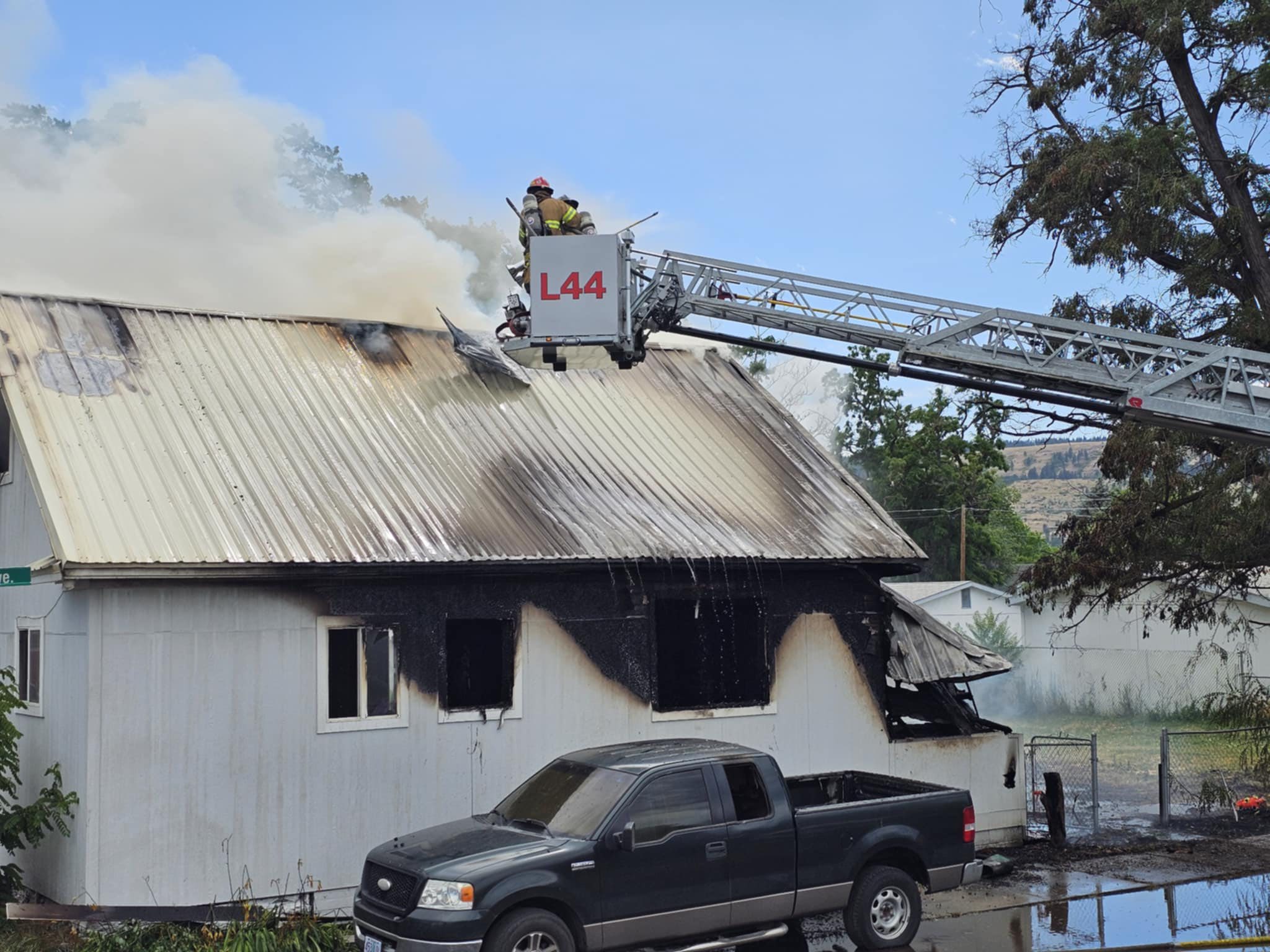Fully vaccinated can drop the masks, skip social distancing
Published 10:00 am Friday, May 14, 2021

- Steve Thompson, a cook at the Longbranch Bar & Eats, La Grande, cleans May 14, 2020, while following COVID-19 restrictions, including wearing a mask. The U.S. Centers for Disease Control and Prevention on Thursday, May 13, 2012, announced fully vaccinated people can go without masks outdoors in crowds and in most indoor settings.
WASHINGTON — In a major step toward returning to pre-pandemic life, the U.S. Centers for Disease Control and Prevention eased mask-wearing guidance for fully vaccinated people on Thursday, May 13, allowing them to stop wearing masks outdoors in crowds and in most indoor settings.
“Today is a great day for America,” President Joe Biden said during a Rose Garden address heralding the new guidance, an event where he and his staff went without masks. Hours earlier in the Oval Office, where Biden was meeting with vaccinated Republican lawmakers, he led the group in removing their masks when the guidance was announced.
“If you are fully vaccinated, you no longer need to wear a mask,” he said, summarizing the new guidance and encouraging more Americans to roll up their sleeves. “Get vaccinated — or wear a mask until you do.”
Oregon Gov. Kate Brown announced Oregon as of May 13 will follow the new guidance, which applies only to fully vaccinated individuals.
“That means Oregonians who are fully vaccinated no longer need to wear masks or social distance in most public spaces,” Brown said in a prepared statement.
The guidance still calls for wearing masks in crowded indoor settings, such as buses, planes, hospitals, prisons and homeless shelters, but it will help clear the way for reopening workplaces, schools and other venues — even removing the need for social distancing for those who are fully vaccinated.
Brown also said the Oregon Health Authority will provide updated guidance for businesses, employers and others to allow the option of lifting mask and physical distancing requirements after verifying vaccination status. And businesses may prefer to continue operating under the current guidance, she said, rather than worrying about verifying vaccination status.
“Oregonians now have a choice of how to protect themselves and others from COVID-19: either get vaccinated, or continue wearing a mask and following physical distancing requirements,” Brown said.
Suzannah Moore-Hemann, executive director of the Union County Chamber of Commerce, said the new less stringent regulations are an indication that the nation is moving in the right direction in terms of the pandemic.
“I think it definitely shows there is progress being made,” Moore-Hemann said.
Moore-Hemann also said the new guidance will help the local economy by making people feel more comfortable about going into stores and attending events.
Union County Commissioner Donna Beverage is also pleased with the decision.
“I am happy about the new guidance. It is a good way to start the summer,” Beverage said.
John Howard, the owner of John J. Howard & Associates, a La Grande business, echoed Beverage’s sentiment.
“It’s a new day and a huge step toward getting back to a normal way of life,” Howard said.
“We have all longed for this moment — when we can get back to some sense of normalcy,” Rochelle Walensky, director of the CDC, said at an earlier White House briefing.
The CDC and the Biden administration have faced pressure to ease restrictions on fully vaccinated people — those who are two weeks past their last required COVID-19 vaccine dose — in part to highlight the benefits of getting the shot. The country’s aggressive vaccination campaign has paid off: U.S. virus cases are at their lowest rate since September, deaths are at their lowest point since last April, and the test positivity rate is at the lowest point since the pandemic began.
Walensky said the long-awaited change is thanks to the millions of people who have gotten vaccinated and is based on the latest science about how well those shots are working.
“Anyone who is fully vaccinated can participate in indoor and outdoor activities — large or small — without wearing a mask or physically distancing,” Walensky said. “If you are fully vaccinated, you can start doing the things that you had stopped doing because of the pandemic.”
The new guidance is likely to open the door to confusion, since there is no surefire way for businesses or others to distinguish between those who are fully vaccinated and those who are not.
“Millions of Americans are doing the right thing and getting vaccinated, but essential workers are still forced to play mask police for shoppers who are unvaccinated and refuse to follow local COVID safety measures,” said Marc Perrone, president of the United Food and Commercial Workers International Union. “Are they now supposed to become the vaccination police?”
Walensky and Biden said people who are not fully vaccinated should continue to wear masks indoors.
“We’ve gotten this far — please protect yourself until you get to the finish line,” Biden said, noting that most Americans younger than 65 are not yet fully vaccinated. He said the government was not going to enforce the mask wearing guidance on those not yet fully vaccinated.
“We’re not going to go out and arrest people,” added Biden, who said he thinks the American people want to take care of their neighbors. “If you haven’t been vaccinated, wear your mask for your own protection and the protection of the people who also have not been vaccinated yet.”
On Capitol Hill, House Speaker Nancy Pelosi said she is not changing the rules requiring masks on the House floor.
“No,” Pelosi told CNN. “Are they all vaccinated?”
Recent estimates have put the percentage of unvaccinated lawmakers in the House at 25%.
That ambiguity over who is and isn’t vaccinated led Lawrence Gostin, a public health law expert at Georgetown University, to declare the CDC guidance “confusing and contradictory.”
“The public will not feel comfortable in a crowded indoor space if they are unsure if the maskless person standing next to them is or is not vaccinated,” he said.
The announcement came as many states and communities have already been lifting mask mandates amid improving virus numbers and as more Americans have been shedding face coverings after getting shots.
To date more than 154 million Americans, nearly 47% of the population, have received at least one dose of COVID-19 vaccine, and nearly 119 million are fully vaccinated. The rate of new vaccinations has slowed in recent weeks, but with the authorization Wednesday of the Pfizer shot for children ages 12 to 15, a new burst of doses is expected in the coming days.
“All of us, let’s be patient, be patient with one another,” Biden said, acknowledging some Americans might be hesitant about removing their masks after more than a year of living in a pandemic that has killed more than 584,000 people in the U.S. and more than 3.3 million people worldwide.
The CDC’s announcement that Americans could begin to shed one of the most visible symbols of the pandemic stood in stark contrast to other nations, with much of the world still struggling to contain the virus amid global disparities in vaccinations.
Just two weeks ago, the CDC recommended that fully vaccinated people continue to wear masks indoors in all settings and outdoors in large crowds.
Walensky said that evidence from the U.S. and Israel shows the vaccines are as strongly protective in real world use as they were in earlier studies and that so far they continue to work even though some worrying mutated versions of the virus are spreading.
The more people continue to get vaccinated, the faster infections will drop — and the harder it will be for the virus to mutate enough to escape vaccines, she stressed, urging everyone 12 and older who is not yet vaccinated to sign up.
And while some people still get COVID-19 despite being vaccinated, Walensky said, it’s rare. She cited evidence that those infections tend to be milder, shorter and harder to spread to others. If people who are vaccinated do develop COVID-19 symptoms, they should immediately put their mask back on and get tested, she said.
There are some caveats. Walensky encouraged people who have weak immune systems, such as from organ transplants or cancer treatment, to talk with their doctors before shedding their masks. That’s because of continued uncertainty about whether the vaccines can rev up a weakened immune system as well as they do normal, healthy ones.
— The Observer contributed to this report.









